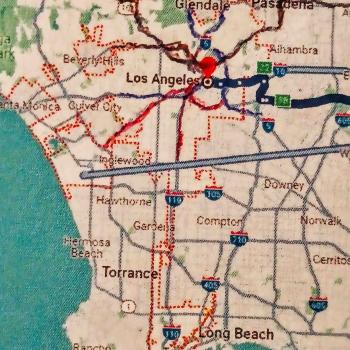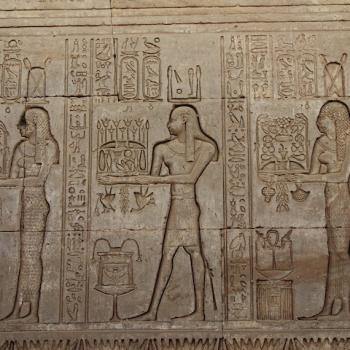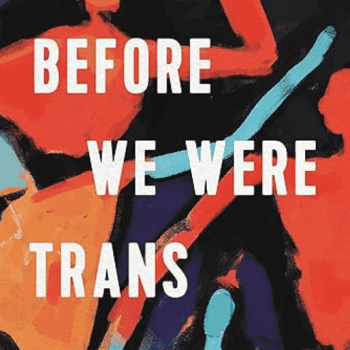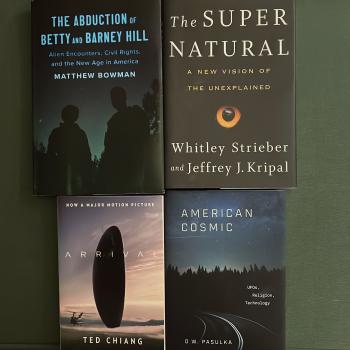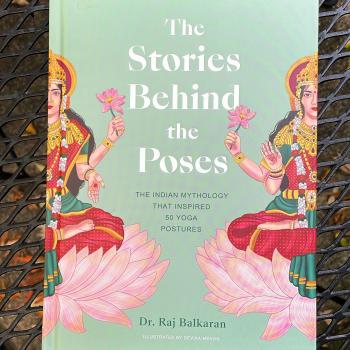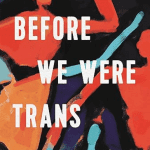Jamie Foxx, after winning the Academy Award for Best Actor for playing Ray Charles in the film biopic Ray, gave an emotional and moving acceptance speech. He began,
I’ve got so many people to thank here tonight and first I’m going to start it out with Taylor Hackford [the Director of Ray]. You took a chance, man. That love for Ray Charles was deep down in the earth somewhere and you opened it up. It’s cracked open. And it’s spilling. And everybody’s drowning in this love. I thank you for taking a chance on this film. And thank you for waiting 15 years to get me to do it. I want to thank you.
All that love for Ray Charles that Foxx speaks about perhaps originates most directly from his pioneering music, which blended Gospel with Rhythm and Blues.
In one scene in the film, Charles is playing his music in a bar and a group of angry church goers storm in, accusing him of blasphemy, “You’re turning God’s music into sex” and “All ya’ll goin’ straight to hell!” Rarely short of a quick retort, Charles leaned into the microphone: “Everyone that wants me to keep playing let me hear an ‘Amen!’” An “AMEN!” roared from the crowd and the good times kept on rollin’.
Ray Charles, who died in 2004, was a charismatic, brilliant, driven, and immensely-talented singer-songwriter and performer. He will be remembered for all these traits. He will also be remembered because he accomplished so much in his long career and he did it all as a blind man. Charles went completely blind at an early age, but through the aid and encouragement, especially of his mother — and through his own force of will — Ray triumphed in the music field.
But, in the face of his success, one of the specters raised in the Charles’ life is why a black child already born into poverty becomes blind. Why is this allowed to happen? Does he deserve to be blind? Is it something he did or didn’t do? Is it something his parents did or didn’t do?
Chris Rock, the comedian who hosted the Oscars the year Foxx won for his depiction of Ray Charles, has raised similar questions in one of his past comedy routines, saying: “You want to talk about unfair, look at Ray Charles. The brother’s got all the money in the world and he’s blind. He’s famous and rich and can’t even get a peak. Come on, can’t somebody do something — transplant an eyeball or something. Let’s get the man a peak, just a peak!” Comedians aren’t the only ones who address these questions of fairness.
In a moment of theological reflection in the film, Charles is having an argument with his devoted wife Della Bea Robinson, who is played by Kerry Washington. Bea pleads, “The only thing that can help you is God, Ray!” But Charles quickly turns on her: “Don’t you talk about God! You have any idea how it feels to go blind and still be afraid of the dark. And every day, you stand and pray just for a little light, and you don’t get nothing. Cause God don’t listen to people like me.” Bea warns, “Stop talking like that.” But Charles presses on, “As far as I’m concerned, me and God is even, and I do what I damn well please.”
These theological tensions are not new. We see them at the beginning of the Gospel text for today. Jesus and his disciples meet a man blind from birth. His disciples ask, “Rabbi, who sinned, this man or his parents, that he was born blind?” The disciples are expressing a bigotry common for the time. Their view was likely a product of being raised in certain streams of first-century culture that thought those with physical disabilities were being punished either for their own sin or the sin of their parents.
Perhaps the man’s parents were not the most exemplary human beings. We don’t know, but as many introductory classes in the sciences are quick to point out, “correlation does not necessitate causation.” Just because a man is born blind and his parents are sinners doesn’t mean that there is a direct cause and effect relationship between the two events. It may be purely coincidental.
Some people have sought to strengthen the correlation between sin and disability with a particular reading of the Holiness Code in Leviticus chapters 17-26, where there is a frequent connection made between physical disability and impurity. The disciples seem to be questioning Jesus from this point of view, but as is so often the case with rabbis, Jesus listens to the question, then reframes the situation from a new angle. Jesus refuses to accept the false dilemma presented by his followers: Do you pick (a) this man is blind because of his own sin, or (b) this man is blind because of his parents’ sin? If this were a multiple choice test, then Jesus did the equivalent of scribbling a third option in the margin and circling it: (c) “Neither this man nor his parents sinned.” Then he offers another choice (d): “He was born blind so that God’s works might be revealed in him.” This seems to be a similar tack to that of the apostle Paul, who described in chapter eight of his letter to the Romans how God is present in all things working for the good — not necessarily the cause of all things, but present in all things, working to make them better.
Nancy Eiesland, Associate Professor of Sociology of Religion at Emory University in Atlanta, is one of a number of theologians that have spent a lot of time in recent years studying our text for today as well as related texts. They are working on what has been called a “liberation theology of disability.” Eiesland has written:
Growing up with a disability, I could not accept the traditional interpretations of disability that I heard in prayers, in Sunday school, and in sermons. “You are special in God’s eyes,” I was often told, “that’s why you were given this painful disability.” Or, “Don’t worry about your suffering now—in heaven you will be made whole.” This confused me. My disability had taught me who I am and who God is. What would it mean to be without this knowledge? Would I be absolutely unknown to myself in heaven, and perhaps even unknown to God? I was assured that God gave me a disability to develop my character. But by age six or seven, I was convinced that I had enough character to last a lifetime. My family frequented faith healers with me in tow. I was never healed. People asked about my hidden sins, but they must have been so well hidden that even I misplaced them. The theology that I heard was inadequate to my experience.
Rodger Kamenetz, another theologian, has done similar work, writing:
I used to think that if something unaccountably bad happened to someone, it needed to be compensated by something good. That was my own internal accounting, my own way of repairing my sense of order, of justice. A boy loses his sight, but he becomes a musical genius [as in the case of Ray Charles]. A teacher of mine lost his mobility to polio, but he gained the ability to be a blessing to others. One time I said such things in a public talk, and a woman in a wheelchair rolled toward me and said with great seriousness and very slowly, “I would like you to consider that a disability means…absolutely nothing.” I heard her and felt how I had glibly covered over my heart with an easy reaction.
Eiesland, Kamenetz, and others in this field ask us to reconsider our understanding of disability.
The importance of disabled theology — especially those who themselves are disabled — is giving voice to those with disabilities who have often been silenced. Instead of the disciples walking around with their able bodies and using their sight to identify and their voice to talk about whether disabilities result from sin, there is a profound shift. You have people who are blind or mute or in a wheelchair writing theology in light of their experiences with their neighbors, with God, and with their disability. Their reflections help empower the disabled to speak and advocate for themselves instead of others speaking for and about them.
There is a similar shift in the Gospel text for today. The scripture reading begins with the disciples talking about the man born blind from birth. Then we see “the neighbors and those who had seen him before as a beggar” talking about him. Finally, the man speaks for himself. He confesses that he doesn’t know the answers to all of their questions, but he adds, “One thing I do know, that though I was blind, now I see.” This formerly blind man’s words have been made famous by John Newton, who quoted him in his hymn “Amazing Grace”: “[I once…] was blind, but now I see.”
The Gospel lesson doesn’t end here. It is a vital shift that the marginalized blind man is healed and empowered to speak for himself, but Jesus presses the shift even further: “I came into this world for judgment so that those who do not see may see, and those who do see may become blind.” The religious leaders gathered around him are incredulous: “Surely we are not blind, are we?” Jesus replied, “If you were blind, you would not have sin. But now that you say, ‘We see,’ your sin remains.”
This is a tremendous reversal. Jesus is saying, not only do I come to give eyes to see and ears to here, but also, I come to give blindness — or put another way — to reveal the blindness of those who think their sight and judgment is perfect. Jesus’ comment here is similar to the point made by the statue of lady justice holding the scales of judgment with a blindfold tied tightly around her eyes, reminding us that despite our best intentions of being unbiased, our prejudices all too often affect our judgment.
By saying, “We see,” the first-century religious leaders crowded around Jesus were revealing their own sin and prejudice in their eagerness to connect sin with the physical blindness of another. Jesus radically undercuts their position even further by saying, “If you were blind, you would not have sin.” Suddenly, this blind beggar is shown as one with keen sight and judgment about what (and who) is really important in life, and the metaphorical blindness of the religious leaders is unmasked. In this sense, Jesus seeks to proclaim, not only “recovery of sight to the blind,” but also the recognition of blindness in the seeing.
This story is not just about a blind man being healed once upon a time in a land far away. It would be significant if it were just about the past, but it is even more import because it continues to teach us today. This story of healing from 2000 years ago continues to challenge us to recognize the ways in which we are blind and can’t recognize our blindness — and the ways in which we are wrong about the blindness of others. As Jesus said elsewhere in the Sermon on the Mount: “Why do you see the speck in your neighbor’s eye, but do not notice the log in your own eye? Or how can you say to your neighbor, “Let me take the speck out of your eye,” while the log is in your own eye? You hypocrite, first take the log out of your own eye, and then you will see clearly to take the speck out of your neighbor’s eye.” We definitely have a log-speck situation with the scripture this morning.
The joy of this morning’s text is that there is hope. There is hope in the case of John Newton in the eighteenth century, who quoted the blind man in John saying that even if I don’t know much else, I do know that “[I once…] was blind, but not I see.” Newton wrote this and the other lines of “Amazing Grace” as an autobiographical reflection on his conversion from being a slave trader.
There is hope in the life of Ray Charles, who had a similar conversion experience in the 20th century. Charles was being escorted to a concert hall in Augusta, Georgia, where he was scheduled to perform, but the building was being picketed by a group protesting that the concert was going to be segregated with only whites allowed on the main dance floor and blacks restricted to the balcony. A young black man managed to get Charles’ attention through the noise of the crowd chanting “NO MORE SEGREGATION!” but Charles response was “That’s how it is. This is Georgia” and “Look man, there ain’t nothing I can do about that. I’m an entertainer. And we all gotta play Jim Crow down here.” But there was a moment when the white organizer of the concert interrupted their conversation to put-down the protester — and, suddenly, Charles began to see. He confessed to his manager, “He’s right” and ordered the band back on the tour bus. When the white organizer of the concert threatened to sue him, Charles reversed his former strategy, and now said to the white man, “I can’t do nothing about it. Ain’t nothing I can do, man.” He remained physically blind, but saw for the first time what he could do to help in the struggle against racism and for Civil Rights. And twenty years later in 1979, in one of those great reversals of history, Ray Charles, who was banned for life from playing in the state of Georgia for his refusal to play Jim Crow concerts, was offered a public apology by the state legislature of Georgia, and his rendition of “Georgia on My Mind” was made the official state song.
Our challenge continues to be in this season of Lent to make space in our lives to listen for God’s call — the places in our living where God is calling us to confess with our mouth: I do not have all the answers, but “One thing I do know, that though I was blind, now I see.”
For Further Reading
- Nancy L. Eiesland and Rebecca S. Chopp, The Disabled God: Toward a Liberatory Theology of Disability.
- Brett Webb-Mitchell, Unexpected Guests at God’s Banquet: Welcoming People With Disabilities into the Church.
- Stanley Hauerwas and Jean Vanier, Living Gently in a Violent World: The Prophetic Witness of Weakness.
Notes
1 This is a paraphrase of Rock’s comments.
2 Nancy Eiesland, “Encountering the Disabled God,” The Other Side, September-October 2002, vol. 38, no. 5. Dr. Eiesland died at the tragically young age of 44 in 2009. You can read her obituary in The New York Times.
3 Rodger Kamenetz, “Was God in This Disaster?” Available at http://www.beliefnet.com/story/158/story_15866.html.
4 See the reading of the Isaiah scroll at the beginning of Jesus’ ministry in Luke 4:18.
5 Matthew 7:3-5. There is a parallel text in the Sermon on the Plain in Luke 6:41-42.





